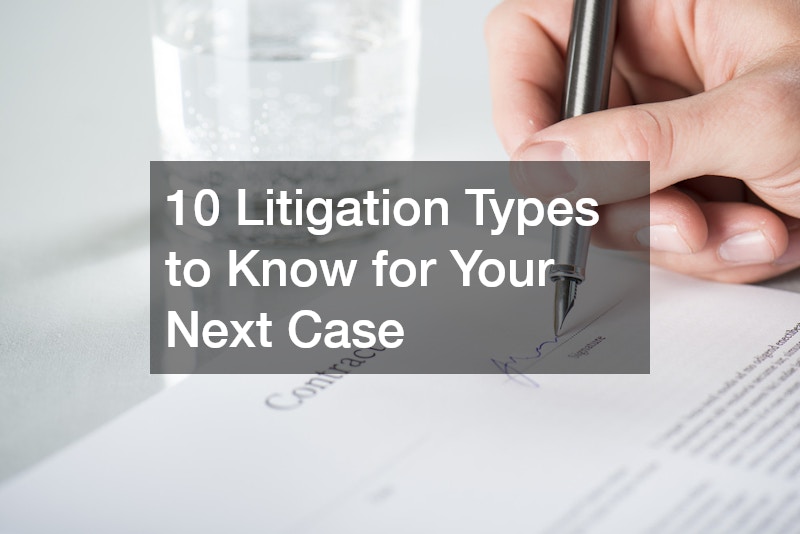When navigating the complex realm of legal issues, understanding the various litigation types and the specialized services offered by different law offices is essential. From personal injuries to criminal offenses, and even securing bail, legal expertise spans multiple domains. Knowing which type of attorney to approach and what kind of litigation you may encounter can vastly improve your odds of a favorable outcome. An aviation accident law firm, DUI attorneys, disability law office, and criminal law experts each play unique roles in the legal landscape. Moreover, bail bond services, including immediate bail bonds and jail bonds, are crucial in criminal cases. In this comprehensive guide, we’ll dive deep into these varied legal services, discussing the types of litigation they handle and the role different legal experts play in our justice system. Whether dealing with large bonds, cash bail bonds, or requiring the assistance of a spinal cord injury lawyer, understanding these facets is invaluable.
Aviation Accident Law Firm
An aviation accident law firm specializes in cases related to aircraft incidents, which can range from commercial airplane crashes to private aircraft mishaps. Such law firms have expertise in aviation laws, regulations, and industry standards, which are crucial in litigating these complex cases. They work with experts in aeronautics, mechanics, and other fields to reconstruct accidents and determine liability. These firms aim to secure compensation for victims or their families, covering medical expenses, lost wages, and pain and suffering.
The litigation types involved in aviation law are multifaceted and often require detailed investigations. In many cases, these legal battles involve multiple parties such as airline companies, aircraft manufacturers, and regulatory bodies. Litigation can be either personal injury lawsuits filed by survivors or wrongful death claims brought by families of deceased victims. Additionally, product liability claims may be levied against manufacturers for faulty components, adding another layer of complexity.
Jurisdictional challenges and international laws also frequently come into play in aviation accident cases. An effective aviation accident law firm must navigate through these complexities to build a strong case. Settlements in such cases are often substantial given the enormity of personal loss and property damage. Understanding these litigation types is essential for anyone dealing with the aftermath of an aviation accident.

DUI Attorneys
DUI attorneys specialize in defending individuals charged with driving under the influence of alcohol or drugs. These attorneys are well-versed in state and local laws governing DUI offenses, which can be intricate and carry severe consequences. They work to protect their clients’ rights, aiming to minimize penalties such as fines, license suspension, or even imprisonment.
Litigation types in DUI cases usually involve criminal defense, administrative hearings, and plea bargaining. Criminal defense entails challenging the prosecution’s evidence, which might include breathalyzer or blood test results, field sobriety tests, and police officer testimonies. DUI attorneys also represent clients in administrative hearings concerning their driving privileges and work towards reducing or eliminating license suspensions.
Another common litigation type is plea bargaining, where the lawyer negotiates with the prosecution to lower charges or penalties. Some cases might also involve civil litigation if there was property damage or personal injury resulting from the DUI incident. Having specialized DUI attorneys ensures that clients receive informed and competent representation tailored to the intricacies of DUI law.
Disability Law Office
A disability law office focuses on advocating for individuals with disabilities, ensuring they receive the benefits and accommodations they are entitled to under laws such as the Americans with Disabilities Act (ADA) and Social Security Disability Insurance (SSDI). Lawyers in this field work to protect their clients’ rights across various sectors, including employment, education, and public accommodations.
The litigation types in disability law often involve claims related to denied benefits and discrimination lawsuits. Clients frequently need representation in appeals processes for SSDI or Supplemental Security Income (SSI) denials. These proceedings can be complex, requiring expert knowledge of medical terminology and administrative law. Another significant litigation type includes cases of disability discrimination in the workplace or educational institutions, where lawyers fight to ensure their clients receive fair treatment and necessary accommodations.
Additionally, disability law offices may handle personal injury cases where individuals become disabled due to accidents or medical malpractice. Litigations in these cases aim to secure compensation for ongoing medical treatment, adaptive equipment, and lost earning potential. Understanding these various litigation types can greatly aid individuals with disabilities in obtaining the justice and benefits they deserve.

Criminal Law
Criminal law encompasses a broad range of offenses, from minor infractions to serious felonies. Attorneys specializing in criminal law defend individuals accused of crimes, ensuring they receive fair trials and competent legal representation. These lawyers can handle everything from shoplifting charges to homicide cases, offering comprehensive defense strategies suited to the specific nature of the alleged crime.
The litigation types in criminal law are diverse, often involving pre-trial motions, plea agreements, trials, and appeals. Pre-trial motions may include requests to suppress evidence or dismiss charges based on procedural errors. Plea agreements often serve to reduce sentences or charges and can be a crucial aspect of a criminal law attorney’s strategy. If cases proceed to trial, these attorneys meticulously prepare their defense, challenge the prosecution’s evidence, and work to persuade the jury of their client’s innocence or mitigate sentencing.
Appeals constitute another significant litigation type in criminal law, allowing convicted individuals to challenge their verdicts or sentences based on legal errors in their initial trials. Criminal law attorneys must be adept at navigating the complexities of appellate courts and ensuring all procedural requirements are met. These various litigation types highlight the extensive and nuanced work criminal law attorneys undertake to protect their clients’ rights.
Immediate Bail Bonds
Immediate bail bonds services provide quick assistance in securing the release of individuals who have been arrested. These services are crucial in alleviating the emotional and financial stress that accompanies detention. Bail bond companies work by posting bail on behalf of the accused, allowing them to await trial or legal proceedings from the comfort of their home rather than in jail.
The litigation types associated with immediate bail bonds often involve surety bonds, property bonds, and cash bonds. Surety bonds are the most common form, where the bail bond company provides a guarantee that the accused will appear in court. Property bonds involve offering real estate as collateral, which requires careful legal documentation and appraisal procedures. Cash bonds entail paying the full bail amount upfront, which might later be refunded provided all court appearances are met.
Legal issues may also arise concerning the forfeiture of bail if the defendant fails to adhere to bail conditions, prompting further legal battles. Bail bond companies often employ skilled attorneys to navigate these litigations efficiently. Understanding the types of litigation and services provided by immediate bail bonds companies can help individuals make informed decisions during crises.

Large Bonds
Large bonds come into play when the bail amounts set by courts are significantly high, typically in cases involving serious charges or flight risks. These large sums serve as a deterrent to ensure that the accused will appear for all court proceedings. Legal experts specializing in large bonds provide crucial assistance in arranging these substantial bails, facilitating the release of the detained individuals.
Litigation types related to large bonds often include negotiating bond amounts and handling legalities surrounding collateral. Attorneys may argue for reduced bail amounts by showcasing the accused’s ties to the community, lack of prior offenses, or other mitigating factors. Collateral for large bonds usually involves high-value assets like real estate or business holdings, necessitating detailed legal scrutiny and documentation.
Additionally, legal professionals must manage issues related to bond forfeitures and retrieval of collateral in cases where the accused meets all court requirements. These processes involve intricate legal maneuvers to protect both the interests of the accused and the entities providing the large bonds. Mastery over these litigation types is essential for effectively navigating the high-stakes nature of large bond scenarios.
Jail Bonds
Jail bonds, also known as bail bonds, are an integral part of the criminal justice system, enabling the release of individuals from jail while awaiting trial. Bail bond companies provide these services, posting the bail amount on behalf of the accused, who in return, typically pays a non-refundable fee to the bond company. This arrangement allows defendants to continue their daily lives while preparing for their court appearances.
The litigation types involved in jail bonds include surety bonds, cash bonds, and property bonds. Surety bonds are the most common and involve a third-party guarantee, usually a bail bond company, which pledges to pay the full bail amount if the defendant fails to appear in court. Cash bonds require the defendant or their family to pay the full bail amount upfront, and property bonds involve using real estate as collateral to secure the bail.
Legal issues can arise if the defendant fails to comply with bail conditions, leading to bond forfeiture and additional legal proceedings to recover the posted bond. Bail bond companies often employ attorneys to handle these litigations and ensure the smooth execution of bail agreements. Understanding the various litigation types associated with jail bonds can help individuals navigate the intricacies of securing bail.

Bail Bond Company
A bail bond company plays a crucial role in the criminal justice system by offering services that help defendants secure their release from jail while awaiting trial. These companies provide financial guarantees to the court, ensuring that the accused will appear for all scheduled hearings. Bail bond companies typically charge a non-refundable fee, calculated as a percentage of the total bail amount, in exchange for their services.
The litigation types associated with a bail bond company include surety bonds, cash bonds, and property bonds. Surety bonds involve the company providing a financial guarantee to the court, ensuring the defendant’s presence. Cash bonds require the full bail amount to be paid upfront by the defendant or their family. Property bonds involve leveraging assets like real estate as collateral to secure the bail, adding a layer of complexity.
Legal challenges may arise if the defendant fails to meet bail conditions, leading to bond forfeiture and subsequent litigation to recover the posted bond amount. Bail bond companies often employ experienced attorneys to navigate these legal intricacies efficiently. Understanding the various litigation types associated with bail bond companies is essential for those seeking to utilize bail services.
Cash Bail Bonds
Cash bail bonds require the defendant or their representative to pay the full bail amount in cash to secure their release from jail. This form of bail is straightforward but can be financially burdensome, especially when the bail amount is substantial. If the defendant appears for all court proceedings, the cash bail is typically refunded at the end of the trial, less any court fees or fines.
The litigation types involved in cash bail bonds include procedural litigation to secure the release, and potential forensic accounting to trace and prove the legitimacy of large cash payments. Attorneys may also be needed to negotiate bail amounts or appeal decisions regarding cash bail as excessive. In cases of non-compliance with court orders, bond forfeiture proceedings can become complex legal battles.
Another significant litigation type involves disputes over the return of the cash bail if conditions are not explicitly met. Legal representation ensures that all transactions follow judicial guidelines and protects the rights of the individual. Hence, understanding these various litigation types is essential when opting for cash bail bonds as a method to secure release from jail.

Spinal Cord Injury Lawyer
A spinal cord injury lawyer specializes in representing clients who have suffered severe injuries to their spinal cord, often leading to life-altering consequences. These attorneys are experts in personal injury law, specifically focusing on cases involving catastrophic injuries. They work to secure compensation for medical expenses, rehabilitation costs, lost wages, and pain and suffering, ensuring their clients receive the financial support needed for long-term care.
The litigation types involved in spinal cord injury cases include personal injury lawsuits, product liability claims, and workers’ compensation claims. Personal injury lawsuits arise when the injury results from someone else’s negligence, such as in car accidents or slip-and-fall incidents. Product liability claims are pertinent if the injury was caused by a defective product, requiring detailed scrutiny of manufacturing standards and industry regulations.
Workers’ compensation claims are relevant when the injury occurs in the workplace, necessitating navigation through complex administrative processes and negotiations with insurance companies. These litigation types often involve thorough investigations, expert testimonies, and intricate legal strategies to establish liability and secure adequate compensation. Understanding these varied litigation types is crucial for effectively navigating a spinal cord injury case.
Navigating the legal landscape can be daunting, particularly given the wide array of litigation types and specialized legal practitioners available. Understanding the role and expertise of different law offices and bail services can significantly enhance one’s ability to manage legal challenges effectively. Aviation accident law firms offer critical expertise in handling complex aviation-related litigations, while DUI attorneys specialize in defending against charges of driving under the influence. Disability law offices advocate for the rights and benefits of individuals with disabilities, and experts in criminal law provide robust defense strategies for a range of offenses.
Immediate bail bonds and large bonds services are essential in securing the release of arrested individuals, enabling them to prepare for their legal proceedings from outside the confines of jail. Jail bonds, bail bond companies, and cash bail bonds offer varied options tailored to different financial circumstances and legal requirements. Additionally, specialized attorneys such as spinal cord injury lawyers ensure that severely injured individuals receive the compensation and support necessary for their recovery and long-term care.
By understanding these different litigation types and the roles of various legal practitioners, individuals and families can make informed decisions and navigate their legal challenges more effectively. Whether facing criminal charges, seeking disability benefits, or demanding justice for a personal injury, having the right legal expertise and understanding the litigation landscape is crucial. This comprehensive guide provides valuable insights into the diverse legal services available, empowering individuals to approach their legal issues with confidence and clarity.



